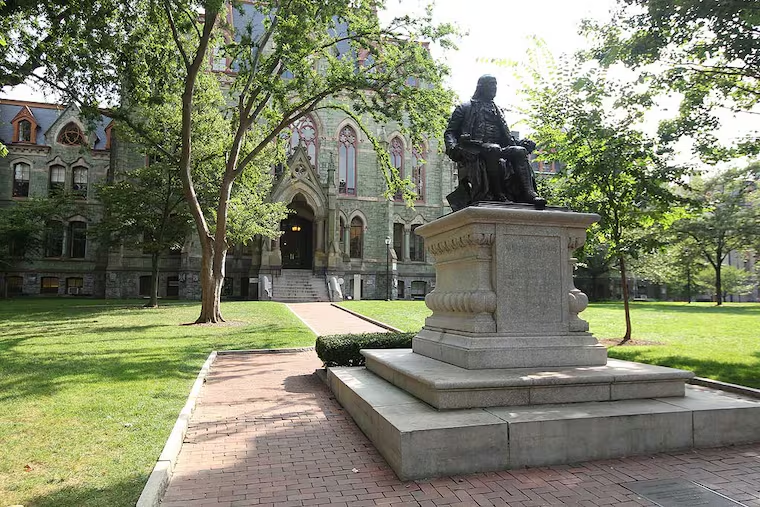As criticism over college reopening plans mounts, Penn students who work in residence halls demand hazard pay, safer conditions
“Parties are generally harmless, though not allowed in a normal year,” said Zoe Osborne, 21, a rising senior from Philadelphia, who is in her second year as a resident assistant at Penn. “They are not harmless now.”

Breaking up a crowded party in a student residence hall was never easy. Now, it could turn dangerous.
It’s just one concern that undergraduate and graduate students who serve as advisers in the University of Pennsylvania’s residence halls have raised as the start of the fall semester approaches.
In a petition, resident and graduate advisers have demanded safer working conditions, hazard pay, and clear protocols for what to do when students break rules designed to combat the spread of the coronavirus.
“Parties are generally harmless, though not allowed in a normal year,” said Zoe Osborne, 21, a rising senior from Philadelphia, who is in her second year as a resident adviser. “They are not harmless now.”
The student advisers, who serve as mentors and guides in helping younger students adjust to campus life, have aired their concerns in a letter to the administration and on a Change.org petition that has garnered more than 1,000 signatures.
“Part of me would just like to drop everything and quit,” said Paola Perez, 25, a graduate associate from New Haven, Conn. “That’s how frustrated I am.”
Penn officials value the student workers and “are working closely with them to address their concerns and reduce risks in this unprecedented situation,” said Stephen J. MacCarthy, vice president of university communications.
The student housing adviser concerns are among a growing chorus of worries from faculty and staff at campuses across the region. Drexel University’s faculty senate this week said all classes should be conducted remotely unless the university can ensure a series of safety requirements, including adequate cleaning, ventilation, and reduced classroom capacities. And even then, in-person instruction should be used only when absolutely necessary, such as for design studios and labs, they said. Temple University’s faculty union last week made similar demands, and a group of faculty at Pennsylvania State University at a virtual rally Wednesday said the university isn’t planning to test enough students and staff for COVID-19 before returning, nor during the semester.
» READ MORE: How Philly-area colleges are planning to test students and staff for coronavirus
The concerns come as some colleges are moving away from in-person classes to most or all virtual instruction or planning for fewer students on campus. Lehigh University announced last week that it would only allow freshmen and students with extenuating circumstances, such as personal or academic hardships, on campus, while the College of New Jersey said all instruction would be remote. Others, including West Chester and Dickinson, previously moved to all remote instruction.
But even with remote instruction, many campuses are planning to bring hundreds, in some cases thousands, of students to live in residence halls. And many more are moving into off-campus housing, raising safety concerns.
Universities have defended their decisions.
“We’re responding to our community,” said Ray Betzner, a spokesperson for Temple University. “Many of our students, especially our first-year students, told us they wanted to have an on-campus component if it could be done safely.”
» READ MORE: Temple University intends to open for in-person classes this fall
Temple maintains it can, noting that more than 150 people have been planning the return since the spring, with the help of university medical experts.
Drexel also maintained it is doing everything possible, including training and testing, to ensure safety, said spokesperson Niki Gianakaris. Classes are scheduled to start Sept. 21.
“Drexel’s decision to move forward with the hybrid learning model was based on the model’s flexibility and adaptability,” she said.
But even some students have questioned the wisdom of bringing so many students back to campus.
“It’s a blatant grab for money and I think they are putting the students at risk,” said Penn resident hall adviser Jay Falk, 20, a rising junior from Alexandria, Va.
» READ MORE: What if students won’t wear masks in class? Professors want assurances that universities will enforce a mandate.
Penn announced last week that most instruction would be conducted remotely. More than 4,000 undergraduates are scheduled to live in university housing.
Resident hall advisers get free housing and half of a meal plan as payment, which students said isn’t enough in the best of times. They are asking for a full meal plan and a stipend. Even then, the work is risky, they said.
“I feel like it’s the choice of being able to have my housing and potentially get sick and die, or figure out something else financially,” Falk said.
Student advisers said they want to be assured they will receive an adequate supply of masks and hand sanitizer and they are looking for guidance on how shared spaces, including laundry rooms, lounges, bathrooms, and kitchens will be kept safe.
Freshmen will test boundaries, Falk said.
“If you can’t trust them to not binge-drink, there’s no reason to trust them to wear a mask,” Falk said.
Administrators, said Hector Kilgoe, a graduate associate from Boston, have told advisers to trust that students will follow safety rules outlined by the campus.
“The whole point of our job is that sometimes people don’t do the right thing, and we are there to make sure everyone is safe,” he said. “Right now, I think one of the most important things is that we get a new contract that lays out all of our responsibilities and the way we are supposed to go about our duties this year.”